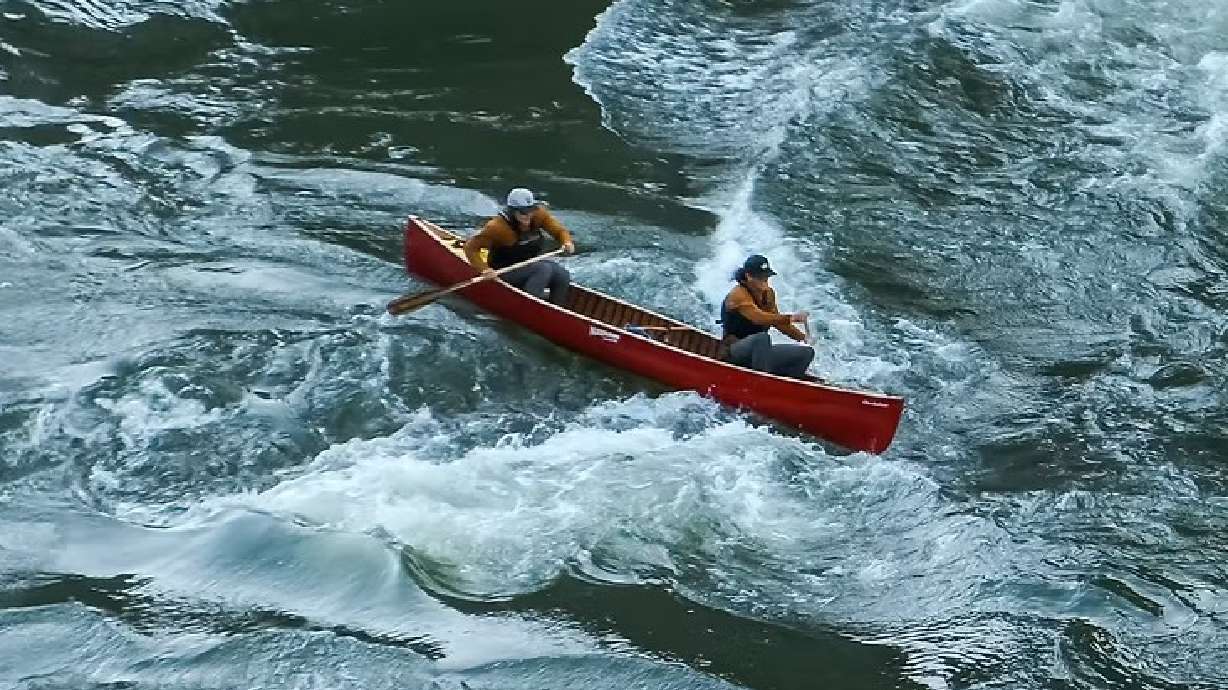Estimated read time: 4-5 minutes
- Braxton Mitchell and Robert Lester canoed 1,300 miles on the Columbia River.
- Their journey, documented in "The Columbia River Canoe Project," highlights river ecosystem importance.
- The documentary premieres in Utah on Jan.16 at Kaysville Theater.
KAYSVILLE — Two years ago, Braxton Mitchell was offered the opportunity of a lifetime: to run the Columbia River from the Continental Divide in Butte, Montana, to the Pacific Ocean. Knowing he'd regret it if he said no, Mitchell, who was 18 at the time, set sail for his very first outdoor expedition, down a river — in a wooden canoe.
The adventure he was about to embark on had a name and a purpose, and he wasn't doing it alone. The Columbia River Canoe Project was spearheaded by his cousin Robert Lester, who lives in Montana, to make a documentary highlighting the critical role rivers play in ecosystems and what can be done to keep them healthy.
The entire trip was 1,300 miles and took the duo 52 days to complete. Mitchell said he really didn't know what he was getting himself into but he's glad he did it.

"I had never been on an outdoor adventure before," the Plain City resident said. "I'm more into motorsports and action sports, so it was definitely different to do this. But I really liked the idea of all the great things I could see and experience on the trip that I wouldn't be able to in any other place. The hard work all paid off."
The hard work included paddling down a river at night and carrying a heavy canoe on land to avoid dangerous rapids. Mitchell recalled having to carry the canoe 24 miles in one day as being one of the most challenging parts of the trip.
"It wasn't supposed to be a fun camping trip; it was more of a huge challenge that we were trying to overcome, and so there was a lot of hard work and the fun kind of came second," Mitchell said. "Carrying the canoe was a big challenge, and getting used to paddling at night to rest in the afternoon was really draining. The longest stretch we carried the canoe was 24 miles in Hood River, Oregon, and we did that in one day."
While the hard work and fun were both part of the excursion, on top of their minds was showcasing the importance of the river and meeting people along the way who knew what it would take to keep the river running healthfully.
"We had three subgoals on this trip," Lester said. "We wanted to focus on the overall health of the Columbia River, but we wanted to talk a lot about natural resource extraction — things like mining and how it has affected the river and industry. Second, we wanted to talk about damming. Damming is kind of a catch-22 because it's an ecological draw that is much better than putting out greenhouse gasses, but it also has had a negative environmental impact on wildlife and our ecosystem, which makes it a tough and interesting topic. Third, we wanted to look at Native Americans' connection to the river, not just in the past, but what that connection looks like now, as well."
Connection was Lester's main driving force when setting out to complete this project, and he said that from the time he was a child, he has loved how rivers connect people to themselves, to others, to the land — and to the sea.
"This is something that I have always wanted to do since I was a little kid," Lester said. "Me and a different cousin of mine would build these little wooden boats and we'd float them down the river by my house all summer long. And then, at the end of the year, we'd let them go to the ocean. We'd put notes in them like a message-in-a-bottle-style, and we fell in love with this idea of water as a means of travel and connectivity."
In a way, the trip was a way for Lester and Mitchell to send a message to anyone who may not know the critical role rivers play in the overall health of the surrounding and expanding ecosystems.
Their message has been turned into a documentary titled "The Columbia River Canoe Project," which premiers in Utah on Jan. 16 at the Kaysville Theater. Touching all the states that the river does, it has already debuted in Oregon and will play at theaters in Montana and Washington.
For more information on the film and to purchase tickets, go to the film's website; or follow The Columbia River Canoe Project on social media.









